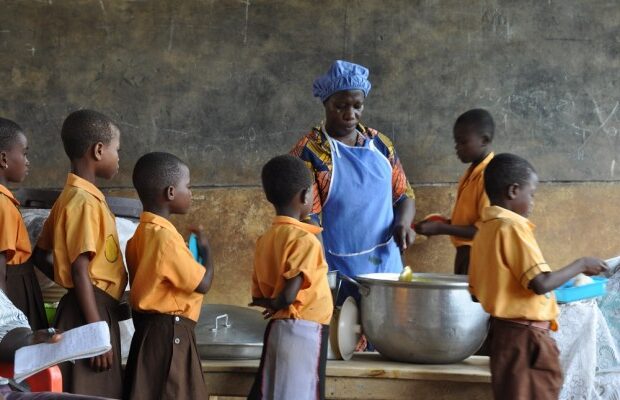School feeding resumes for pupils nationwide
Caterers of the Ghana School Feeding Programme (GSFP) across the 16 regions of Ghana commenced the provision of food for their respective beneficiary schools on Tuesday, September 7, for the third term of the academic calendar.
National Coordinator of GSFP, Dr Gertrude Quashigah, entreated the caterers to deliver their duties to ensure that the beneficiary pupils are fed with the right quality and quantity of meals within the 67 school going days.
“We take this opportunity to congratulate all caterers for their endurance, patience and dedication towards their work; and we welcome all our 3,448, 065 beneficiary pupils and the caterers into the 3rd term of 2021,” she said in a statement.
She entreated the caterers to strictly observe all COVID-19 protocols in line with the government’s directive to mitigate the spread of the infection.
The National Coordinator pleaded with the government “to critically consider and approve our request for an upward adjustment in the feeding grant per child to cushion our caterers in their work”.
The GSFP is also calling for an increment of 50% from GH¢1.00 to GH¢1.50 pesewas.
Meanwhile, President Akufo-Addo has announced a GH₵31million fund released by the Ministry of Finance to settle arrears owed to the school feeding caterers in the country.
“I am happy to announce that payments have been made to caterers in all the regions. It is true that caterers in the Western and Western North were not paid due to insufficient funds. That has been resolved,” he stated on September 4, during his second-day tour of the Western Region.
The Ghana School Feeding Programme (GSFP) is an initiative of the comprehensive Africa Agricultural Development Programme (CAADP) Pillar 3, which seeks to enhance food security and reduce hunger in line with the United Nations (UN) Sustainable Development Goals (MDGs) on hunger, poverty and malnutrition.
The basic concept of the programme is to provide children in public primary schools with one hot, nutritious meal, prepared from locally grown foodstuffs, on every school-going day.
The aim is to spend 80% of the feeding cost in the local economy.
The immediate objectives are to reduce hunger and malnutrition, increase school enrolment, attendance and retention, and boost domestic food production in deprived communities of the country.
The development objective is to reduce poverty and enhance food security.



